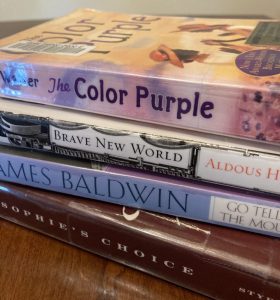Legal group files brief to support blocking law banning books from Iowa K-12 schools
July 28th, 2025 by Ric Hanson
(A report from the Iowa Capital Dispatch) – A legal organization focused on freedom of expression filed a new legal brief Monday asking the Eighth Circuit Court of Appeals to keep the injunction in place blocking Iowa’s ban on books that are not “age appropriate” from K-12 schools.
PEN America, a nonprofit focused on freedom of expression, filed the brief in support of the legal challenge mounted by publishers including Penguin Random House, the Iowa State Education Association and several authors, including Laurie Halse Anderson, John Green and Jodi Picoult. The plaintiffs are challenging Senate File 496, a 2023 Iowa law that prohibits books depicting sex acts from being available in K-12 school libraries, as well as banning programs, materials and instruction related to gender identity and sexual orientation for K-6 students.
U.S. District Court Judge Stephen Locher has ruled to block enforcement of multiple portions of the law, including the prohibition on books involving sexual or LGBTQ+ content. But that injunction could be overturned by the Eight Circuit Court of Appeals, which had ruled in August 2024 that Locher’s “analysis” of the case was not correct and returned it to the district court.

These are some of the books recently banned from Iowa schools under a new state law. (Photo by Ed Tibbetts)
PEN America argued in its brief for the appeals court to keep the latest injunction in place, saying the law “undermines public education systems in violation of the First Amendment by denying students’ rights to receive information, infringing on authors’ free speech rights, and misapplying the obscenity doctrine.”
Iowa public schools had removed 3,400 books from school shelves by the end of 2024, according to the Des Moines Register, including classic literature like “1984” by George Orwell, “The Bluest Eye” by Toni Morrison and “I Know Why the Caged Bird Sings” by Maya Angelou. Many school districts have expressed uncertainty about what books can be available in schools under the law, as the Iowa Department of Education had declined to respond to advocates asking for more clarification about “age appropriate” materials as defined by SF 496.
Locher wrote the law “places the burden on local school districts and school officials to determine whether a book is permitted,” and that the measure was “facially unconstitutional” when looking at previous court precedents on First Amendment cases.
In the Monday court brief, PEN America staff attorney Elly Brinkley echoed these concerns, writing that laws that target any and all descriptions of sex in literature have been “squarely condemned” by the U.S. courts in previous decisions, as it abridges students’ First Amendment rights to receive information.
In addition to the lawsuit filed by Penguin Random House, ISEA and authors, there is another challenge filed by Lambda Legal and ACLU of Iowa on behalf of students, teachers and the organization Iowa Safe Schools. Locher ruled in May that parts of the law challenged by Lambda Legal and the ACLU are also unconstitutional, issuing an injunction in May ruling that K-6 students must be allowed to join Gender Sexuality Alliances (GSA) and other student groups related to LGBTQ+ identities and that school districts and teachers must be allowed to provide instruction and materials that contain references to gender identity and sexual orientation, though they cannot be focused on these topics.





